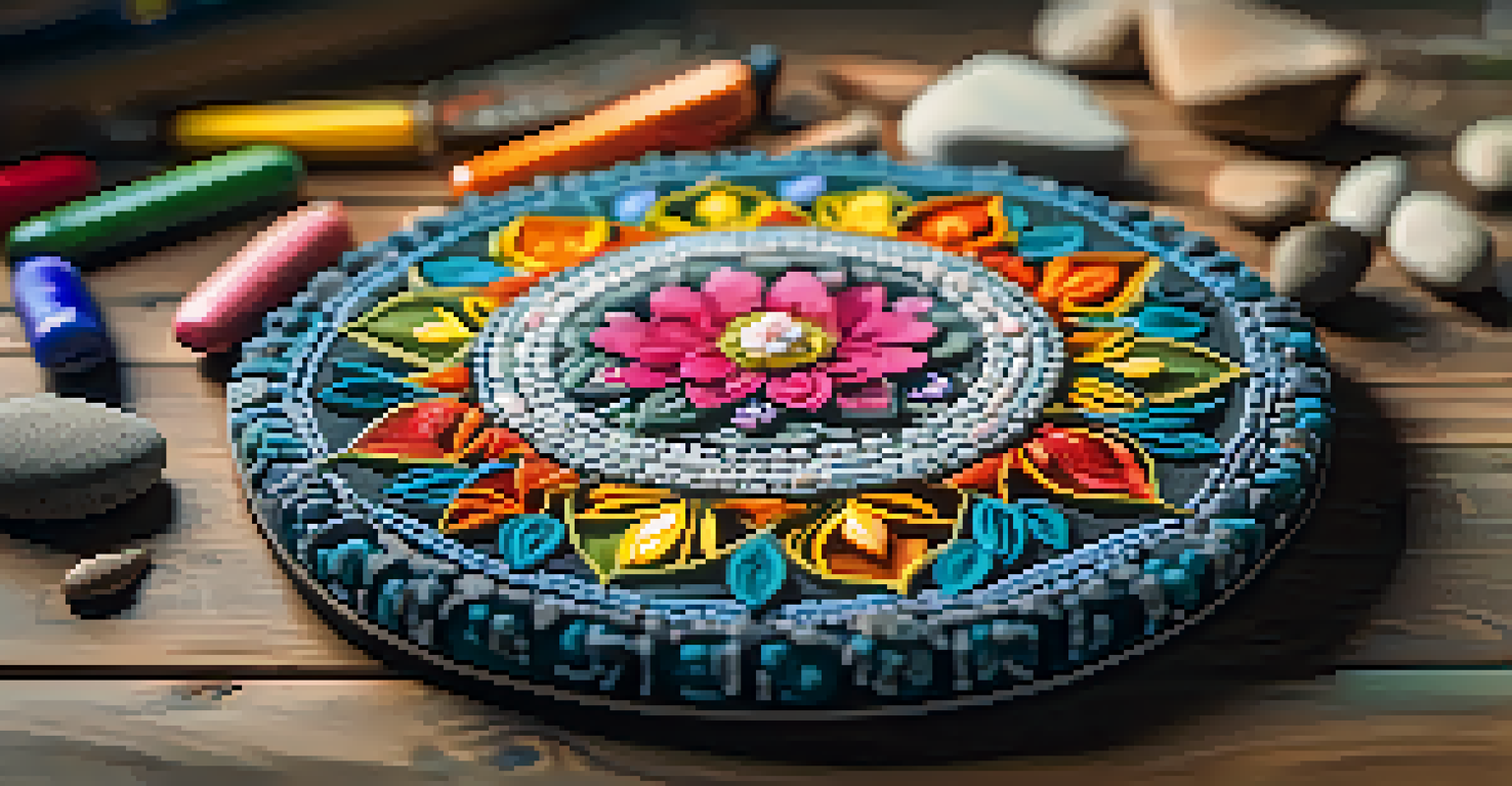Cultural Contexts of Entheogens in Consciousness Exploration

Understanding Entheogens and Their Role in Culture
Entheogens are substances that have been used for centuries in various cultures to facilitate spiritual experiences and enhance consciousness. These natural or synthetic compounds, such as psilocybin mushrooms or ayahuasca, often play a pivotal role in religious and healing practices. By providing altered states of awareness, entheogens allow individuals to connect with deeper aspects of themselves and the universe.
The use of entheogens is a way to explore consciousness, and those who do so often find profound insights and connections to the universe.
The cultural contexts surrounding entheogens are rich and diverse, reflecting the beliefs and traditions of the societies that use them. In many indigenous cultures, these substances are considered sacred and are integrated into rituals that promote communal bonding and personal transformation. For instance, shamans often utilize entheogens as tools for healing, divination, and guidance during important life events.
Understanding these cultural contexts is essential to appreciating the broader implications of entheogen use. They are not merely recreational substances but are steeped in history and meaning, which can vary significantly from one culture to another. This complexity invites a deeper exploration of how these compounds influence individual and collective consciousness.
Historical Perspectives on Entheogens in Different Cultures
Historically, entheogens have been employed across various cultures for thousands of years. For example, the use of peyote by Native American tribes and the ingestion of ayahuasca in Amazonian cultures showcase the rich tapestry of practices surrounding these substances. Each culture has its unique approach to entheogen use, often tied to their worldview and spiritual beliefs.

In ancient Greece, the Eleusinian Mysteries featured the consumption of a secret potion believed to be an entheogen, leading to profound spiritual experiences for participants. Such events highlight how societies have long recognized the potential of these substances to unlock altered states of consciousness and foster a deeper understanding of existence.
Entheogens in Cultural Practices
Entheogens have been integral to various cultures for spiritual experiences and healing, highlighting their deep historical significance.
These historical examples illustrate that the relationship between humans and entheogens is not a modern phenomenon but rather a longstanding aspect of cultural practice. By examining these practices, we gain insight into how different societies have navigated consciousness exploration through the ages.
The Role of Rituals in Entheogen Use
Rituals play a crucial role in how entheogens are used within various cultural contexts. They provide a structured framework that guides individuals through their experiences, ensuring a sense of safety and purpose. This can include everything from sweat lodges to guided ceremonies led by experienced practitioners.
Entheogens have the potential to heal the mind and spirit, offering a path to understanding that is both ancient and modern.
For example, in a traditional ayahuasca ceremony, participants often undergo a series of rituals that prepare them mentally and spiritually for the experience. These rituals may involve singing, chanting, and setting intentions, all of which help create a conducive environment for exploration of consciousness. Such practices highlight the importance of community and shared experience in these journeys.
By emphasizing the ritualistic aspect of entheogen use, we see how cultures create meaning around these substances. The rituals not only enhance the experience but also provide a sense of belonging and connection to something greater than oneself.
Modern Adaptations of Entheogen Practices
In recent years, there has been a resurgence of interest in entheogens, particularly in Western cultures. This revival often involves adapting traditional practices to fit contemporary lifestyles, blending ancient wisdom with modern therapeutic approaches. Many people now seek out entheogens for personal growth, healing, or exploration of consciousness outside of traditional cultural contexts.
For instance, guided retreats in nature or urban settings have emerged, where individuals can safely explore entheogenic experiences without the deep-rooted cultural frameworks that originally surrounded them. These adaptations raise important questions about cultural appropriation and the ethical implications of using entheogens outside their traditional contexts.
Modern Adaptations and Ethics
The resurgence of entheogen use in Western cultures raises questions about cultural appropriation and the ethical implications of adapting traditional practices.
As society continues to evolve, the way we engage with entheogens will also change. It’s vital to strike a balance between honoring traditional practices and exploring the potential benefits these substances can offer in modern contexts.
Psychological and Spiritual Benefits of Entheogens
Research has begun to uncover the psychological and spiritual benefits associated with entheogen use. Studies suggest that substances like psilocybin can lead to significant improvements in mental health conditions such as depression and anxiety. The insights gained during these experiences often lead to lasting changes in perspective and behavior.
Moreover, many users report profound spiritual experiences that foster a sense of interconnectedness with nature and humanity. These encounters can lead to transformative insights, helping individuals find meaning and purpose in their lives. The therapeutic potential of entheogens is being increasingly recognized in both scientific and spiritual communities.
As we delve deeper into these benefits, it becomes clear that entheogens offer more than just a temporary escape. They provide a pathway to understanding the self and the universe, encouraging personal growth and healing in ways that can be deeply impactful.
Challenges and Controversies Surrounding Entheogen Use
Despite their potential, the use of entheogens is not without challenges and controversies. Legal restrictions in many countries pose significant barriers to research and access, limiting the ability of individuals to explore these substances safely. Additionally, the stigma surrounding drug use can deter people from seeking out the benefits that entheogens may offer.
Furthermore, the appropriation of indigenous practices by those outside the culture raises ethical concerns. It’s crucial to approach entheogen use with respect and understanding, recognizing the historical significance and cultural importance they hold for many communities. Engaging with these substances responsibly involves acknowledging their roots and the wisdom of those who have used them for generations.
Psychological Benefits of Entheogens
Research indicates that entheogens like psilocybin can significantly improve mental health and foster profound spiritual experiences.
Navigating these challenges requires a collective effort to foster a more informed and compassionate approach to entheogen use. By advocating for responsible practices and legal reform, we can create a more inclusive environment for exploration and understanding.
The Future of Entheogens in Consciousness Exploration
Looking ahead, the future of entheogens in consciousness exploration is filled with potential. As research continues to expand, we may see more acceptance and integration of these substances into therapeutic and spiritual practices. This shift could lead to a broader understanding of their benefits and a reevaluation of societal attitudes toward them.
Moreover, the blending of traditional practices with modern science could pave the way for innovative approaches to mental health and well-being. Imagine a world where entheogens are embraced not only for their recreational potential but also as valuable tools for healing and personal transformation.

Ultimately, the future of entheogens hinges on our collective willingness to engage with them thoughtfully and respectfully. By fostering a culture of curiosity and respect, we can unlock the full potential of these fascinating substances in our ongoing exploration of consciousness.